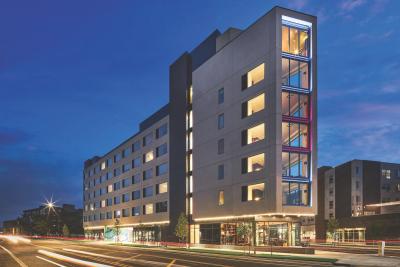In the heart of the Rocky Mountains, Denver is navigating the fluctuating landscapes of a post-pandemic world. Looking to the future, the city’s travel and tourism blueprint involves combining robust infrastructure investment and development with a leisure scene that attracts a wide range of visitors.
Denver is particularly focused on conventions and events. “Specific to the downtown area, getting more citywide conventions back is necessary for full recovery,” said Emmy Hise, senior director of hospitality analytics at CoStar Group, who also is based in Denver. “People are coming back to the office, but corporate travel is not quite back yet.”
Leisure travel is another story. Denver has hosted several headliner events and concerts, including superstars like Taylor Swift and Ed Sheeran. Daniel del Olmo, president, hotels & restaurants for Denver-based Sage Hospitality Group, said these types of events—and more —are huge demand-drivers for the hotel industry all year round. Sage Hospitality operates more than 3,300 rooms in Denver’s metro area across 16 hotels.
“In the summer months, people travel to Denver for the unparalleled experience of seeing a concert at Red Rocks, to take in a game with one of our four major league sports teams, including the NBA champion Denver Nuggets, and even to tour one or a few of the more than 150 craft breweries in Denver,” he said. “In the winter, many guests stop in Denver on their way to and from the world-renowned slopes to our west in the Rocky Mountains.”

Del Olmo is confident business travel will pick up, and pointed to Denver being home to many businesses that bring people to the city for meetings and project work, including 10 Fortune 500 companies. “In fact, major companies like VF Corporation, Salesforce and others have either opened major offices or fully relocated their organizations to Denver since 2020,” he added.
That being said, del Olmo noted that office occupancy has been slower to recover. Citing CBRE data, he said there is an office vacancy rate of 28.8 percent as of the second quarter of this year. “This has understandably slowed the return of business travel, but also the return of local office workers patronizing our restaurants and outlets,” he said. “We combat this by capitalizing on the leisure demand in the market, but also by ensuring that we act as great partners to the business accounts that do continue to bring guests into Denver.”
Capitalizing on leisure can be a good plan for Denver hotels, and Hise noted that the city is setting up its infrastructure for tourism. The Denver airport is the third-busiest airport in the world—something del Olmo said isn’t by mere happenstance. “More than 78 million passengers are expected to travel through Denver International Airport this year,” he said.
Hise noted the light rail system that connects directly to the downtown area. “Denver is targeting more international travel to the market, which is good because international visitors stay longer and spend more,” she said. Additionally, Hise said that Denver’s downtown area has made a concerted effort to make the city walkable, as well as add bike and scooter lanes throughout. “You can get around without having a car,” she added. “They are making it more walkable so that people staying at the hotel can walk over the arena, for instance.”
While occupancy hasn’t fully recovered to pre-pandemic numbers, average daily rate and revenue per available room have surpassed 2019 figures, according to data from CoStar.
Looking Ahead, Facing Challenges
When it comes to the challenges for Denver, perhaps the story isn’t as unique as other major markets. “Denver, like all other major cities in the U.S., continues to have challenges with labor shortages, rising operating costs, lagging office occupancies and an increase in homelessness,” del Olmo said.
To combat labor shortages, Sage Hospitality has implemented several different initiatives to increase workplace flexibility, such as piloting a four-day workweek program at hotels in Denver and ensuring wages and benefits are competitive.
Hise agreed that the top challenges for Denver aren’t unique to the city. “It’s the same thing most downtown areas are contending with, and that’s addressing the perception and reality of crime and homelessness in the area,” she said. “If someone were here to do a site tour for business or a convention and they witness something unfavorable, it could deter tourism.”
Even so, development goes on. According to CoStar, 67 hotels with 9,591 rooms are in the pipeline for Denver. By the end of this year, seven hotels with 752 rooms are expected to open.
“With Denver being our home base, we absolutely have plans to continue to grow our presence here with hotels, but also with mixed-use developments and restaurants. We believe that Denver is poised for continued growth and development,” del Olmo said. “Denver welcomed more than 36 million visitors last year, a 15 percent increase over 2021 and a record high. We know that people will continue to come here for business and leisure, and we will be here with beautiful places to welcome them.”

